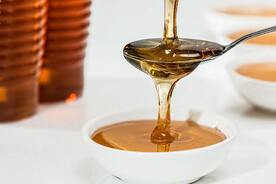
So I've had a few emails and comments on my Sugar Free Challenge, that a lot of you are struggling, the tips, prep, and info was definitely not enough! Clients are calling for their support sessions at a higher rate than normal, and most of the comments and concerns prelude to the uncovering of the fact that “I think I might be addicted”.
I've had a lot of 'bargaining', “what if I just eat the natural sugar, like adding dates to things or banana smoothies?” These all might be the healthier options, especially if your coming off the hard stuff, but why are these foods so craved for? It's hard wired, and it's not your fault!
So what exactly does sugar do to our brains that make it so, well addictive?
From the first taste sugar sends a message to the brain, activating the its reward system. That’s right; sugar has a similar effect on the reward center of the brain as spending time with friends, sex, exercise, laughing, and even drugs. This reward system is a series of electrical and chemical path systems across several different regions of the brain. The main chemical involved in this reward system is dopamine.
Eating more sugar, or sugar (including simple carbohydrates) on a regular basis actually acts differently in the brain than other foods which we will compare shortly but for now, to get a little technical ;like drugs,sugar spikes dopamine release in the nucleus accumbens. Over the long term, regular sugar consumption actually changes the gene expression and availability of dopamine receptors in both the mid-brain and frontal cortex. Specifically, sugar increases the concentration of a type of excitatory receptor called D1, but decreases another receptor type called D2, which is inhibitory. Regular sugar consumption also inhibits the action of the dopamine transporter, a protein which pumps dopamine out of the synapse and back into the neuron after firing.
Okay, enough of the technical, what this means is repeated access to sugar over time leads to prolonged dopamine signalling, greater excitation of the brain’s reward pathways and a need for even more sugar to activate all of the mid-brain dopamine receptors like before. The brain becomes tolerant to sugar – and more is needed to attain the same “sugar high.”
Whenever we eat any food dopamine is released in the brain. Eating the same foods that are not high glycemic foods all the time, dopamine levels start to even out and we no longer find the dish as satisfying as it was the first time. Have you ever had something you liked to eat and eat it everyday for a week; is it as great on Saturday as it was on Monday or Tuesday?

Unfortunately, as we have discussed, sugar on the brain acts differently; no matter how much sugar a person consumes, the dopamine levels will never even out enough to discourage an individual from eating more sugar. It is hard wired to be a quick and easy energy fuel, but today our energy expenditure are no longer longer need quick or easy.
The World Health Organization recommends that no more than 10 % of an individual’s diet should come from sugar. So how do we achieve these recommendations when the addiction to sugar is hard wired into us?
The best way to get back on track is do a a reboot, you clean up your computer this way, what about your biological computer, The brain.
Strictly limiting or excluding all sugary foods processed and natural for as little as 1 week will help you to reset your palate and your neurons. Processed sugary foods, will start to smell and taste exactly as what they are; processed. Natural sweets will taste sweeter, and become much more satisfying and isn't that what we are all craving...... satisfaction, oh sweet satisfaction.
Support is crucial for this kind of reboot, support from friends, like minded individuals, and professionals like me. I will be creating a 7 Day Sugar Detox Challenge, compiling low sugar recipes, tips, strategies, and a forum for us to get together and chat about our struggles. Look for this coming soon, but for now, if you are struggling with food challenges and would like to work closely with a professional that will tailor meal plans, lifestyle suggestions, and strategies catered to your individuality, please contact us for a free evaluation, to start you on your path to optimal health.
My best tips today for detoxing from sugar; activate the reward centres of the brains with the above mentioned activities..... Spending time with friends and family, sex, exercise, laughing! Except that you are going through a hard time detoxing and talk to your brain about all the benefits it, and your entire body, will receive.
Stay strong!
~In Health